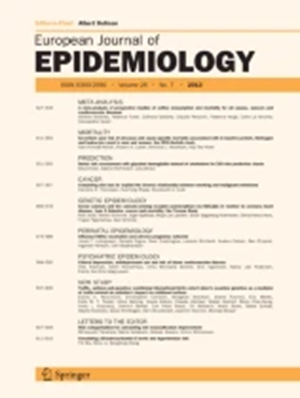The SG90 cohort of the oldest-old in Singapore.
IF 5.9
1区 医学
Q1 PUBLIC, ENVIRONMENTAL & OCCUPATIONAL HEALTH
引用次数: 0
Abstract
The global population is ageing rapidly. While genetics, lifestyle, and environment are known contributors to healthspan, most insights are drawn from Western cohorts, leaving Asian populations underrepresented despite unique biological, lifestyle, and cultural factors. The SG90 cohort study aimed to fill knowledge gaps in healthy ageing by identifying modifiable medical, biological, lifestyle, psychological, behavioural, and social factors that contribute to longevity in the oldest-old. The study recruited 1,158 participants aged 85 and above from the Singapore Chinese Health Study (SCHS) and Singapore Longitudinal Aging Study (SLAS) between 2015 and 2021. Data collection involved face-to-face interviews to obtain sociodemographic, lifestyle, sleep, functional status, quality of life, medical conditions and healthcare economics information, along with clinical assessments covering physical examinations, anthropometry, physical performance, cognition, and mental health. Biospecimens, including blood, saliva, stool, urine, toenails, hair, and skin tape strips were collected to support extensive multi-omic and cellular analyses. Participants, primarily female (64.5%) and Chinese (97.5%) with a median age of 87 years [interquartile range (IQR): 86-89], were mostly non-smokers (72.1%) and infrequent alcohol consumers (94.9%), with 66.5% exercising regularly. Functional assessments indicate high independence, with median Basic activities of daily living (BADL) and Instrumental ADL (IADL) scores of 20 (IQR: 19-20) and 14 (IQR: 11-16), respectively. 36% of participants rated their self-reported health as good to excellent. The SG90 cohort study offers a comprehensive clinical and biological data resource on healthy ageing among Asia's oldest-old, laying a foundation for targeted interventions to promote healthy longevity and quality of life.SG90是新加坡最老的人群。
全球人口正在迅速老龄化。虽然遗传、生活方式和环境都是已知的健康寿命的影响因素,但大多数见解都来自西方人群,尽管有独特的生物、生活方式和文化因素,但亚洲人群的代表性不足。SG90队列研究旨在通过确定有助于老年人长寿的可改变的医学、生物学、生活方式、心理、行为和社会因素,填补健康老龄化方面的知识空白。该研究在2015年至2021年间从新加坡华人健康研究(SCHS)和新加坡纵向老龄化研究(SLAS)中招募了1158名85岁及以上的参与者。数据收集包括面对面访谈,以获取社会人口学、生活方式、睡眠、功能状态、生活质量、医疗状况和医疗保健经济学信息,以及包括体格检查、人体测量、身体表现、认知和心理健康在内的临床评估。收集生物标本,包括血液、唾液、粪便、尿液、脚趾甲、头发和皮肤胶带条,以支持广泛的多组学和细胞分析。参与者主要是女性(64.5%)和中国人(97.5%),中位年龄为87岁[四分位数间距(IQR): 86-89],大多数不吸烟(72.1%)和不经常饮酒(94.9%),66.5%经常锻炼。功能评估显示高度独立性,基本日常生活活动(BADL)和工具性生活活动(IADL)得分中位数分别为20 (IQR: 19-20)和14 (IQR: 11-16)。36%的参与者认为他们自我报告的健康状况很好或很好。SG90队列研究为亚洲老年人健康老龄化提供了全面的临床和生物学数据资源,为有针对性的干预措施奠定了基础,以促进健康长寿和生活质量。
本文章由计算机程序翻译,如有差异,请以英文原文为准。
求助全文
约1分钟内获得全文
求助全文
来源期刊

European Journal of Epidemiology
医学-公共卫生、环境卫生与职业卫生
CiteScore
21.40
自引率
1.50%
发文量
109
审稿时长
6-12 weeks
期刊介绍:
The European Journal of Epidemiology, established in 1985, is a peer-reviewed publication that provides a platform for discussions on epidemiology in its broadest sense. It covers various aspects of epidemiologic research and statistical methods. The journal facilitates communication between researchers, educators, and practitioners in epidemiology, including those in clinical and community medicine. Contributions from diverse fields such as public health, preventive medicine, clinical medicine, health economics, and computational biology and data science, in relation to health and disease, are encouraged. While accepting submissions from all over the world, the journal particularly emphasizes European topics relevant to epidemiology. The published articles consist of empirical research findings, developments in methodology, and opinion pieces.
 求助内容:
求助内容: 应助结果提醒方式:
应助结果提醒方式:


